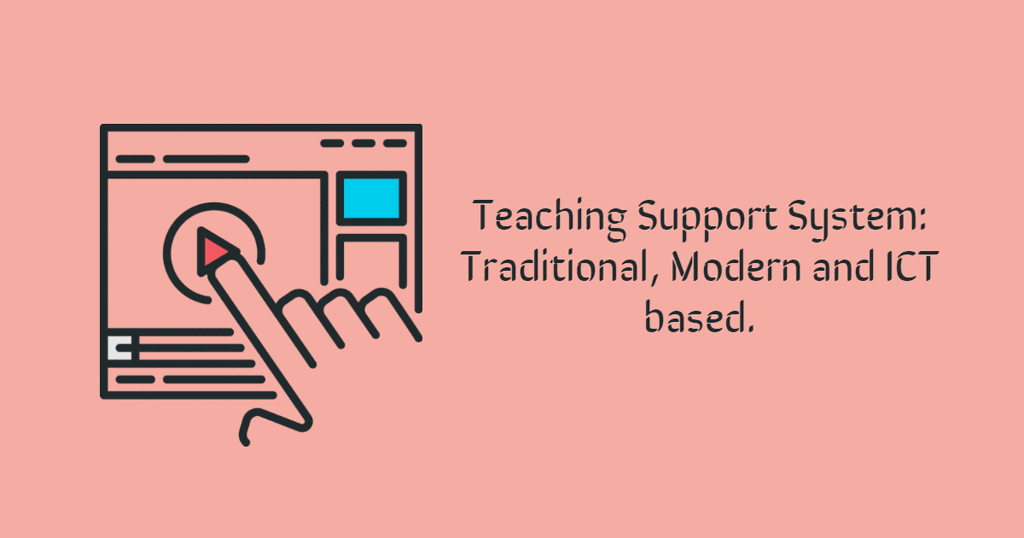Teaching Support System | Teaching Aptitude for Teaching Exam - B.Ed Entrance PDF Download
Teaching Support System
Teaching Support System refers to a collection of tools designed to enhance student achievement by empowering teachers with new skills and capabilities.
 Function: It serves as a mechanism that aids in the improvement of student performance by guiding teachers in making informed decisions and facilitating the transfer of relevant information.
Function: It serves as a mechanism that aids in the improvement of student performance by guiding teachers in making informed decisions and facilitating the transfer of relevant information.
Evolution: The evolution of Teaching Support Systems has progressed from conventional methods to modern techniques, eventually transitioning to ICT (Information and Communication Technology) based educational approaches.
Impact: This shift enables teachers to acquire new competencies and enhance student achievement, particularly in areas where performance is lacking.
Example: For instance, the integration of online platforms and educational software can provide personalized learning experiences, allowing educators to cater to diverse student needs more effectively.
[Intext Question]
1. Traditional Teaching Support System
Traditional Teaching Method or System includes conventional methods of teaching that are used in the classroom for knowledge generation.
- It follows a teacher-centered approach which aims at high test scores, grades, etc.
- This method was based on the memorization of facts, objective information, and correct knowledge.
- Here, the teacher relies on textbooks, lectures, and written assignments.
- Hence, the traditional teaching aids include Blackboards, Textbooks, Charts, Pictures, Models, Flashcards, Globes, Maps, Worksheets, etc. These aids involve a sense of vision and further enhance the observation skills of learners.
- This technique of teaching is a one-way flow of information, i.e., from the teacher. This method is still being adhered to in schools as it fosters more interaction between the teacher and student.

2. Modern Teaching Support System
Modern Teaching Method reflects educational progressivism as it is based on understanding, application, analysis, evaluation, innovation and critical thinking of facts.
This method aims at learning, retention, accumulation of valuable knowledge and skills.
Hence, the modern teaching aids include:
- Internet
- Surfing
- Laptops
- Computer
- Educational Games
- Online Dictionaries
- Power-point Slides and Games
- Online e-books
- Online Tests
- Educational CDs and DVDs
- Projectors
- Interactive Whiteboards or Smart Boards
Digitization in Teaching, Learning Assessment, and Feedback
- Digital transformation in education enhances the learning process, assessment techniques, and feedback mechanisms.
- It plays a crucial role in fostering integrative approaches and nurturing social responsibility along with civic engagement.
Collaborative Learning and Problem-Solving
- Modern teaching methodologies emphasize collaborative learning and problem-solving as fundamental components.
3. ICT Based Teaching Support
- ICT, which stands for Information and Communication Technology, involves electronic methods for capturing, processing, storing, and disseminating information.

- ICT-based teaching support aims to improve learning using computer and communications technology.
- ICT serves as a crucial tool for educators and learners, enabling information storage, retrieval, and manipulation.
- Various forms of ICT in education include computer-assisted learning, video-conferencing, projectors, and mobile devices.
Role of ICT in Education
- ICT engages students in interactive activities and enhances cognitive skills.
- Examples of ICT tools are computers, the internet, telephone, radio, and audio-visual equipment.
Importance of ICT Competencies
- Educators need to develop innovative practices and new competencies in ICT for effective teaching and training.
- ICT skills are essential for modern educators to adapt to evolving teaching methodologies.
Significance of Teaching Support System
- Teaching support systems are pivotal in facilitating learning through ICT tools.
- They aid in creating engaging learning environments and fostering skill development.
| ICT Tools | Examples |
|---|---|
| Computers | Used for research, simulations, and data analysis. |
| Internet | Provides access to vast information resources and enables communication. |
| Telephone | Facilitates remote communication and collaboration. |
| Radio | Utilized for broadcasting educational programs and reaching a wider audience. |
| Audio-visual Equipment | Enhances multimedia presentations and interactive learning experiences. |
[Intext Question]
Importance of Teaching Aids
- Students learn more effectively when they are appropriately motivated using various teaching aids.
- Teaching aids offer concrete examples to enhance conceptual understanding.
- Effective utilization of teaching aids supports long-term retention of concepts.
- Teaching aids provide hands-on experiences that directly engage students in the learning process.
- Utilizing teaching aids helps in expanding students' vocabulary.
- Teaching aids foster an environment of curiosity and engagement among students.
- They contribute to making the classroom dynamic and lively.
- By aiding in comprehensive understanding, teaching aids discourage rote memorization.
|
26 videos|24 docs|11 tests
|
FAQs on Teaching Support System - Teaching Aptitude for Teaching Exam - B.Ed Entrance
| 1. What are the key components of a traditional Teaching Support System? |  |
| 2. How does a modern Teaching Support System differ from a traditional one? |  |
| 3. What are some examples of ICT-based Teaching Support Systems? |  |
| 4. How can Teaching Support Systems benefit educators and students? |  |
| 5. What role does a Teaching Support System play in B.Ed entrance exams? |  |

|
Explore Courses for B.Ed Entrance exam
|

|

















